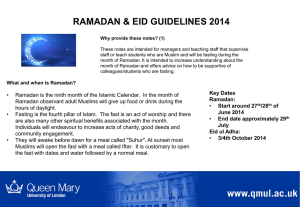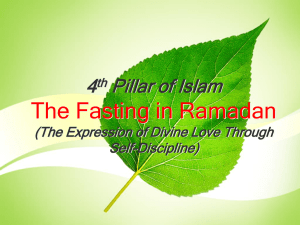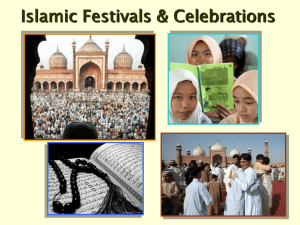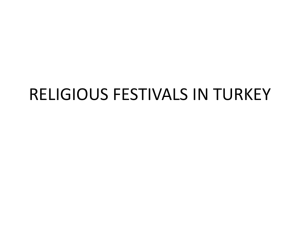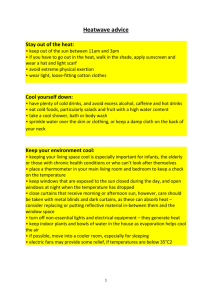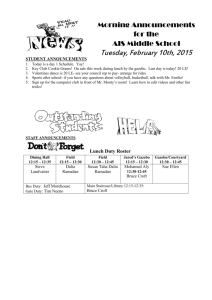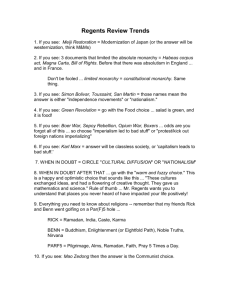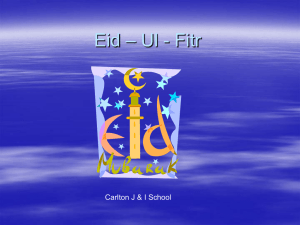California Three Rs Project Rights, Responsibilities, and Respect
advertisement
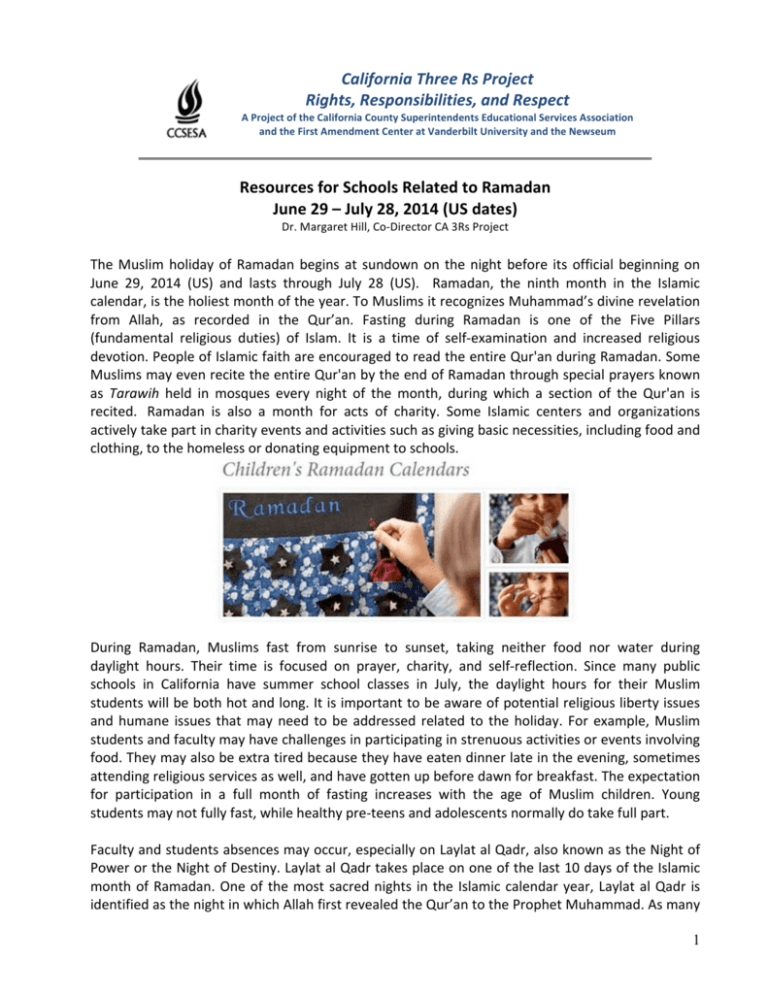
California Three Rs Project Rights, Responsibilities, and Respect A Project of the California County Superintendents Educational Services Association and the First Amendment Center at Vanderbilt University and the Newseum Resources for Schools Related to Ramadan June 29 – July 28, 2014 (US dates) Dr. Margaret Hill, Co-­‐Director CA 3Rs Project The Muslim holiday of Ramadan begins at sundown on the night before its official beginning on June 29, 2014 (US) and lasts through July 28 (US). Ramadan, the ninth month in the Islamic calendar, is the holiest month of the year. To Muslims it recognizes Muhammad’s divine revelation from Allah, as recorded in the Qur’an. Fasting during Ramadan is one of the Five Pillars (fundamental religious duties) of Islam. It is a time of self-­‐examination and increased religious devotion. People of Islamic faith are encouraged to read the entire Qur'an during Ramadan. Some Muslims may even recite the entire Qur'an by the end of Ramadan through special prayers known as Tarawih held in mosques every night of the month, during which a section of the Qur'an is recited. Ramadan is also a month for acts of charity. Some Islamic centers and organizations actively take part in charity events and activities such as giving basic necessities, including food and clothing, to the homeless or donating equipment to schools. During Ramadan, Muslims fast from sunrise to sunset, taking neither food nor water during daylight hours. Their time is focused on prayer, charity, and self-­‐reflection. Since many public schools in California have summer school classes in July, the daylight hours for their Muslim students will be both hot and long. It is important to be aware of potential religious liberty issues and humane issues that may need to be addressed related to the holiday. For example, Muslim students and faculty may have challenges in participating in strenuous activities or events involving food. They may also be extra tired because they have eaten dinner late in the evening, sometimes attending religious services as well, and have gotten up before dawn for breakfast. The expectation for participation in a full month of fasting increases with the age of Muslim children. Young students may not fully fast, while healthy pre-­‐teens and adolescents normally do take full part. Faculty and students absences may occur, especially on Laylat al Qadr, also known as the Night of Power or the Night of Destiny. Laylat al Qadr takes place on one of the last 10 days of the Islamic month of Ramadan. One of the most sacred nights in the Islamic calendar year, Laylat al Qadr is identified as the night in which Allah first revealed the Qur’an to the Prophet Muhammad. As many 1 Muslims believe that this day holds more power in prayer than a thousand months, some spend the whole day in prayer and reading the Qur’an. Sunni Muslims traditionally observe Laylat al Qadr on the 27th day of Ramadan, while Shi’as believe the 23rd day to be the most important. Since the specific day of the revelation is uncertain, many Muslims spend the last 10 days of Ramadan focused on prayer. American Muslim Ahmad Issa helps his daughter put her shoes on after having said the sunset prayer marking the beginning of Ramadan at his local Dar Al-­‐Hijrah Islamic Center in Falls Church, Virginia. Many Muslims in the United States celebrate Eid al-­‐Fitr (also Id al-­‐Fitr or Eid ul-­‐Fitr) at the end of Ramadan with a three-­‐day feast beginning at sunset on the last day of the long fasting period. Eid al-­‐Fitr is an important Islamic holiday that involves many Muslims waking up early and praying either at an outdoor prayer ground or a mosque. Many Muslims dress in their finest clothes and decorate their houses with lights and ornaments. Old wrongs are forgiven and money is given to the poor. Special foods are prepared and friends or relatives are invited to share the feast. Gifts and greeting cards are exchanged and children receive presents. According to Islamic belief, Eid al-­‐ Fitr is a joyous occasion but its underlying purpose is to praise God and give thanks to Him. Though Eid al-­‐Fitr is not a federal public holiday in the United States, many Islamic businesses and organizations alter their business hours. In places where there is a large Muslim population, groups are campaigning for schools to designate Eid al-­‐Fitr as a day off without attendance penalty. Some have been lobbying to have Eid al-­‐Fitr become a school holiday. Since this year the first day of Eid is a weekend so it will probably not be an issue. Resources and Lessons for Learning About Ramadan and Eid al-­‐Fitr Ramadan http://www.holidays.net/ramadan/ During the month of Ramadan, Muslims around the world spend the daylight hours in a complete fast. The Arabic word for "fasting" (sawm) literally means "to refrain" -­‐ and it means not only refraining from food and drink, but from evil actions, thoughts, and words. Site has annoying ads. Ramadan Moon http://www.pbs.org/wnet/religionandethics/?p=12013 This Religion and Ethics NewsWeekly page filmed in 2002 is an interview by PBS host Bob Abernathy with the scientists and clergy who study the moon to determine when is the proper time to begin the Ramadan holiday. For additional information see http://www.moonsighting.com/. 2 Ramadan & Eid al-­‐Fitr http://islam.about.com/od/ramadan/ Here is general information about Ramadan and Eid al-­‐Fitr from an academic perspective. Eid al-­‐Fitr http://eid-­‐al-­‐fitr.123holiday.net/ At the end of Ramadan, Muslims throughout the world have a three-­‐day celebration called Eid al-­‐ Fitr (the Festival of Fast-­‐Breaking). It is a time to give charity to those in need, and celebrate with family and friends the completion of a month of blessings and joy. Ramadan is Here http://www.pbs.org/wnet/religionandethics/episodes/august-­‐6-­‐2010/ramadan-­‐is-­‐here/6760/ This Religion and Ethics NewsWeekly site provides a video clip of Muslim adherents from many ethnic background discussing the annual fast for Ramadan and what it means to them. Muslim Belief and Practice: Ramadan Fasting http://www.pbs.org/wnet/religionandethics/week809/belief.html This Religion and Ethics NewsWeekly site provides a video clip of an interview by PBS Bob Abernathy in 2004 of people discussing the reason for fasting at Ramadan. Eid al-­‐Fitr -­‐ Discussion http://www.teachersdomain.org/resource/islam08.socst.world.glob.eidalfitr/ This 4-­‐minute video by Religion and Ethics NewsWeekly features Ramadan at a school and was produced for the general public. However, the video is accompanied by a background essay, discussion questions, and a transcript for teachers. The materials are free but users must register. Ramadan Observance – Lesson Plan http://www.teachersdomain.org/resource/islam08.socst.world.glob.lpramadan/ In this lesson, students investigate the traditions and spiritual aspects of Ramadan using segments from Religion & Ethics Newsweekly and other resources. Registration required/ Islamic Celebrations – Lesson Plan http://www.teachersdomain.org/resource/islam08.socst.world.glob.islamceleb/ Muslims end their month-­‐long observance of Ramadan with Eid Al-­‐Fitr, the "Feast of Breaking the Fast." In this video, with transcript and guide from Religion & Ethics Newsweekly, members of the Islamic Center of Washington, DC discuss the significance of these annual religious events. Ramadan http://cmes.arizona.edu/node/638#R This instructional resource developed by Lisa Adele for the Center for Middles Eastern Studies includes a PowerPoint, overview for teachers, picture notes, a Fact Sheet and classroom activities. Ramadan http://www.history.com/topics/holidays/ramadan/videos/history-­‐of-­‐ramadan#history-­‐of-­‐ramadan This short History Channel video provides an overview of the Muslim observance of Ramadan. 3 Children’s Literature for Learning About Ramadan and Eid al-­‐Fitr Blackwell, Amy. Ramadan (Holidays & Celebration). Chelsea house, 2009. Middle School Douglass, Susan. Ramadan. Lerner, 2003. Elementary Ghazi, Shuhaib Hamid. Ramadan. Iqra' International Educational Foundation, 1996. Elementary Gnojewski, Carol. Ramadan: A Muslim Time of Fasting, Prayer, and Celebration. Enslow Publishers, 2004. Elementary Heiligman, Deborah. Holidays Around the World: Celebrate Ramadan and Eid Al-­‐Fitr: With Praying, Fasting, and Charity. National Geographic Society, 2006. Upper Elementary-­‐ Middle School Hoyt-­‐Goldsmith, Diane. Celebrating Ramadan. Holiday House, 2002. Upper Elementary – Middle School Jalali, Reza. Moon Watchers: Shirin’s Ramadan Miracle. Tilbury House Publishers, 2010. Elementary Jeffrey, Laura. Celebrate Ramadan. Enslow Pub., 2007. Middle and High School Kahn, Hena. Night of the Moon. Chronicle Books, 2008. Elementary Katz, Karen. My First Ramadan. Holt, 2007. Upper Elementary MacMillan, Diane. Ramadan and Id Al-­‐Fitr. Enslow Pub., 2008. Elementary Marx, David. Ramadan (Rookie Read-­‐About Holidays Series). Scholastic, 2002. Early Elementary Pirotta, Saviour. Id-­‐Ul-­‐Fitr. Rosen, 2007. Upper Elementary – Middle School Sievert, Terri. Ramadan: Islamic Holy Month. Coughlan Publishing, 2006. Elementary Whitman, Sylvia. Under the Ramadan Moon. Whitman, Albert & Company, 2011. Elementary Zucker, Jonny. Fasting and Dates: A Ramadan and Eid-­‐ul-­‐Fitr Story. Barron’s, 2004. Early Elementary 4
